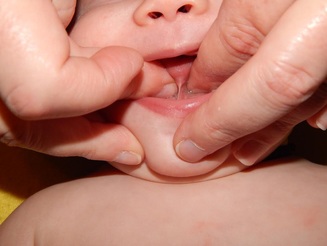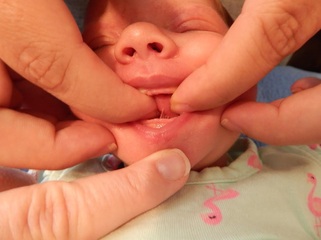Home & Scheduling • Contact Us • Meet Us
Blog • Tongue Tie • Free Online Class
Tongue-Tie Wisdom
"Does my baby have a tongue (or lip) tie?"
If you're curious about whether or not your baby has a tongue or lip tie, you're in the right place for some words of wisdom from an IBCLC experienced in working with tongue and lip tied babies!
While IBCLCs cannot diagnose your baby with lip or tongue-tie, we can help you understand if the impact of your baby’s oral tethers can be mitigated for breastfeeding with simple positioning/hold changes and we can help stabilize other parts of your breastfeeding while we investigate and improve your baby's oral-motor skills. If your baby's oral-tethers are symptomatic enough to cause bumps in your nursing journey, then its possible this is a clue to issues down the road with feeding, swallowing, speech and even sleeping, so receiving time-sensitive (but experienced) lactation care is super important.
Should I see an IBCLC before or after seeing a pediatric dentist?
It's imperative to know that frenectomy (the procedure to release the frenulum under a baby's tongue or lip) outcomes are greatly optimized by working with a tongue-tie knowledgeable IBCLC before getting an assessment from a pediatric dentist or ENT. From knowing the local tongue-tie care provider-landscape, to helping coordinate, strengthen and activate your baby’s tight oral muscles (sometimes this can avoid an unnecessary or premature frenectomy), to helping you improve your baby's post-procedure outcomes (and avoid reattachments), seeing an IBCLC prior to scheduling your baby's appointment with a frenectomy provider is imperative. A tongue-tie experienced IBCLC will not only know precisely which provider will be a fit for your baby's particular oral-restrictions (not all providers are versed in all types of restrictions). In our practice, parents receive tailored and targeted pre and post-frenectomy guidance to ensure their journeys are as efficient, effective and affordable as possible.
But how exactly does an IBCLC help before and after a frenectomy?
In addition to helping parents map out their baby's tongue and lip-tie care, an IBCLC will help habilitate a baby's oral-motor function via strengthening and coordinating their oral function, and she will help you manage, stabilize and protect breastfeeding (latch, nipple pain, milk supply, etc.) so that once oral issues are resolved, both mom and baby are ready for each other and original breastfeeding goals can still be met.
Words of Wisdom:
For the best outcomes, don't take shortcuts in tongue-tie care. Too often we work with families who only go to whoever is easiest to see, and skip visiting experts because they are out of network or have a cost. The end-result can be bigger eventual expenses from unaddressed ties, ties which were not properly released, and a continuation of symptoms such as nipple pain, decreased milk supply and weight issues with baby.
Tongue-ties matter to both breast and bottle fed babies!
Because tongue or lip tie is something that a baby is born with, both breast and bottle-fed babies can be affected.
Babies who nurse are able to stretch their tongues and lips to an extent with nursing, yet babies who bottle-feed don't always use the same vigor and work the same muscles. So while some may think that tongue-tie isn't a big deal in bottle-fed babies since mom isn't being injured and her supply may not be at-risk, it's incredibly important (if not more important) to have a lactation consultant who also works with bottle-feeding babies investigate your baby's mouth and feeding if you suspect that your baby may have a tie…lactation consultants can help strengthen and coordinate leaky bottle latches, decrease increased gas from bottle-feeding, help you find a bottle that works well for you baby, and so much more.
And finally...
Before continuing your Google-journey, we invite you to read our blog post "5 Myths About Tongue-Tie" to help you understand what is and isn't important about ties.
If you're ready to start your baby's oral-motor journey to suck-cess, reach out!
While IBCLCs cannot diagnose your baby with lip or tongue-tie, we can help you understand if the impact of your baby’s oral tethers can be mitigated for breastfeeding with simple positioning/hold changes and we can help stabilize other parts of your breastfeeding while we investigate and improve your baby's oral-motor skills. If your baby's oral-tethers are symptomatic enough to cause bumps in your nursing journey, then its possible this is a clue to issues down the road with feeding, swallowing, speech and even sleeping, so receiving time-sensitive (but experienced) lactation care is super important.
Should I see an IBCLC before or after seeing a pediatric dentist?
It's imperative to know that frenectomy (the procedure to release the frenulum under a baby's tongue or lip) outcomes are greatly optimized by working with a tongue-tie knowledgeable IBCLC before getting an assessment from a pediatric dentist or ENT. From knowing the local tongue-tie care provider-landscape, to helping coordinate, strengthen and activate your baby’s tight oral muscles (sometimes this can avoid an unnecessary or premature frenectomy), to helping you improve your baby's post-procedure outcomes (and avoid reattachments), seeing an IBCLC prior to scheduling your baby's appointment with a frenectomy provider is imperative. A tongue-tie experienced IBCLC will not only know precisely which provider will be a fit for your baby's particular oral-restrictions (not all providers are versed in all types of restrictions). In our practice, parents receive tailored and targeted pre and post-frenectomy guidance to ensure their journeys are as efficient, effective and affordable as possible.
But how exactly does an IBCLC help before and after a frenectomy?
In addition to helping parents map out their baby's tongue and lip-tie care, an IBCLC will help habilitate a baby's oral-motor function via strengthening and coordinating their oral function, and she will help you manage, stabilize and protect breastfeeding (latch, nipple pain, milk supply, etc.) so that once oral issues are resolved, both mom and baby are ready for each other and original breastfeeding goals can still be met.
Words of Wisdom:
For the best outcomes, don't take shortcuts in tongue-tie care. Too often we work with families who only go to whoever is easiest to see, and skip visiting experts because they are out of network or have a cost. The end-result can be bigger eventual expenses from unaddressed ties, ties which were not properly released, and a continuation of symptoms such as nipple pain, decreased milk supply and weight issues with baby.
Tongue-ties matter to both breast and bottle fed babies!
Because tongue or lip tie is something that a baby is born with, both breast and bottle-fed babies can be affected.
Babies who nurse are able to stretch their tongues and lips to an extent with nursing, yet babies who bottle-feed don't always use the same vigor and work the same muscles. So while some may think that tongue-tie isn't a big deal in bottle-fed babies since mom isn't being injured and her supply may not be at-risk, it's incredibly important (if not more important) to have a lactation consultant who also works with bottle-feeding babies investigate your baby's mouth and feeding if you suspect that your baby may have a tie…lactation consultants can help strengthen and coordinate leaky bottle latches, decrease increased gas from bottle-feeding, help you find a bottle that works well for you baby, and so much more.
And finally...
Before continuing your Google-journey, we invite you to read our blog post "5 Myths About Tongue-Tie" to help you understand what is and isn't important about ties.
If you're ready to start your baby's oral-motor journey to suck-cess, reach out!
TONGUE & LIP-TIE EDUCATION for PARENTS
What is a tongue tie, and how can it affect breastfeeding?
What is a tongue tie, and how can it affect breastfeeding?
Common reasons to have a tongue or lip assessed for ties*:
Baby:
Mom
- Difficulty with latching to breast or bottle
- Hovers over areola but doesn't draw in nipple
- Tires easily
- Slow weight gain, or weight loss
- Clicking when feeding from the breast or bottle
- Clamps mouth on nipple, collapses bottle nipple
- Low milk transfer from breast or bottle
- Prolonged feeds
- Persistent or frequent thrush
- Unable to hold in a pacifier
- Reflux and excessive fussiness; sounds "wet" in throat or gurgley when swallowing
- Gags a lot
- Issues accepting solid foods
- Future speech issues
- Cavities
Mom
- Very sore, cracked, raw or bleeding nipples (sometimes doesn't have soreness)
- Compressed-looking nipples after latching
- Low milk supply over time
- Bacterial and fungal breast infections which fester after tongue tie injury
- Early weaning and feelings of disappointment in mom
Online Resources



